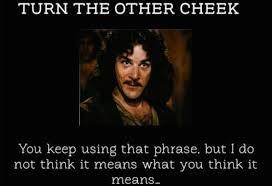Turn the Other Cheek?
What did Jesus mean when He said to turn the other cheek if someone slaps you (Matthew 5:38,39)? Or if someone should sue you and take you shirt, we’re to give him our cloak also (Matthew 5:40)? Or if anyone forces you to carry their stuff for one mile, to carry it an extra mile (Matthew 5:41)? How are we to interpret these verses? If we interpret them literally, Christians would be the poorest, most abused people on the planet. So what the heck is Jesus talking about? Are we not to defend ourselves? How to these passages apply to our lives?
A good interpreter will take into consideration the following;
-the type of literature the particular scripture is in…
-the immediate context of the verse…
-are there figures of speech or idioms being used?…
-how do other scriptures apply to these particular verses?…we know the bible doesn’t contradict itself so we have to interpret a particular scripture in light of other scriptures also.
So let’s look at several of these scriptures. We’ll start with the well-known verses in Exodus 21:22-25 and Leviticus 24:18-20. These are the verses about taking “an eye for an eye”. These verses are known as the ‘Lex Talionis’ or the law of retaliation. They imply that if someone caused you to lose an eye, that their eye should be blinded as well. But remember, this is a legal code, meant to prevent people from retaliating. It’s a way of making sure the punishment fits the crime. It’s meant to prevent people from retaliating, to let the law punish the offender by making the punishment proportional to the offense. This law only applied to the government justice system. It prevented people from getting personal revenge.
Leo Tolstoy, a 19th century Russian novelist and social reformer, said this verse was meant to prohibit all violence, public or private, either by you, the police or the military. He went so far as to not resisting a thief of murderer. If this was the meaning of the verse (and it’s not), this would prevent us from disciplining our own children when they disobey.
The bible also tells us to ‘resist the devil’ in Ephesians 6:13 James 4:7 and 1st Peter 5:8,9. Paul resisted Peter publicly in Galatians 2:11-21. Roman 13:1-7 clearly endorses the right and responsibility of human government to resist and punish evildoers.
If someone attacks your neighbor, we’re called to defend them in Romans 12:17-21 & 1st Peter 2:21-23. What Jesus is forbidding is taking personal revenge when nothing is at stake except our pride, our reputation and our so-called rights.
Let’s be clear, Jesus is not advocating moral compromise or total pacifism. Remember, He has taught responsibility and morality. He even violently resisted the money-changers in the Temple in Matthew 21:12-17.
In Matthew 5:39 notice He says when someone slaps you on the “right” cheek. When someone does this to you, they’re slapping you with the back of their hand. This is considered a degrading & insulting assault on your dignity and honor. This is where Jesus says to show them the other cheek. This is saying that you’re not offended by their action and that you’re not taking revenge on them. What would you do if someone attacked you? Defend yourself! Jesus is not calling you to be stupid when it comes to our physical welfare or that of others. He is only talking about an insult to your honor.
In Matthew 5:40, Jesus says that “If anyone would sue you and take your tunic, you should let them have your cloak as well.” But remember, in the first century a tunic was like a shirt and a cloak was like a coat (it was also used as bedding at night). In Ezekiel 22:26,27, it says “If ever you take your neighbors cloak in pledge, you shall return it to him before the Sun goes down, for that is his covering, and it is his cloak for his body in what else shall he sleep.”

If taken literally, what’s to prevent a person from demanding your shoes, socks, pants, your 401k and virtually anything else? You’d soon have a bunch of naked Christian paupers running around. The people in the first century understood this as meaning that even though the law protects you, it may occasionally be necessary to give up some of your possessions to a poor person. But this is a voluntary giving up on your part.
What about Matthew 5:41 that says if anyone forces you to go one mile with him, go 2 miles. The Roman military could force you to carry their provisions for them for up to one mile. The Jews looked upon this as degrading. The point Jesus is making is to be willing to be exploited for the sake of the gospel. Go above and beyond what they are demanding of you even when it entails an unjust burden on you. But again, this is voluntary on your part.
In Matthew 5:42 when Jesus calls us to “give to the one who begs and not to refuse the one who would borrow from us.” This doesn’t mean we’re to give money to anyone for anything. In 2nd Thessalonians 3:10-12, Paul says “if anyone is not willing to work, let him not eat.” It also says in Proverbs 11:15 17:18 & 22:26 not to give to lazy people who won’t work when they’re perfectly capable to. So again, discretion & good judgement is advised.
The last of these controversial verses Is in Matthew 5:43-48 where Jesus tells us to love your enemies. God did this with us in Romans 5:8 that says “But God demonstrated His own love for us in this; While we were still sinners, Christ died for us.” We are told to love our enemies because God loves them (John 3:16) and we should to. This is why, for the most part, America has treated our prisoners-of-war humanely. Yes, they’re our enemy and yes, we will fight against them in a government sanctioned war, but no we will not mis-treat them as prisoners. And we will remember that they are people made in God’s image.
To sum all this up, these commands are illustrative of what love often does rather than what love always does or is commanded to do. Remember, you shouldn’t take a verse out of its immediate context or how it fits in with the rest of scripture.
For His Kingdom,
Dave Maynard
https://BSSSB-LLC.com









